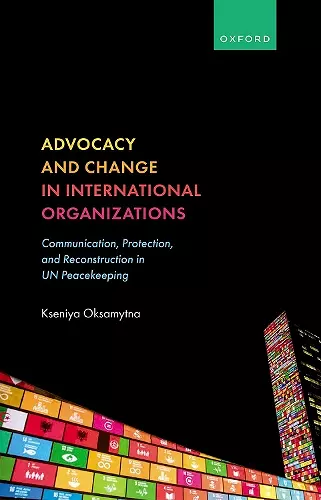Advocacy and Change in International Organizations
Communication, Protection, and Reconstruction in UN Peacekeeping
Format:Hardback
Publisher:Oxford University Press
Published:21st Sep '23
Currently unavailable, our supplier has not provided us a restock date

Winner of the 2024 ISA Chadwick F. Alger Best Book Award
This book demonstrates how the advocacy-focused framework explains the origins of three workstreams of contemporary UN peacekeeping operations: communication, protection, and reconstruction. The issue of strategic communications was promoted by UN officials through the strategy of persuasion.How do international organizations change? Many organizations expand into new areas or abandon programmes of work. Advocacy and Change in International Organizations argues that they do so not only at the collective direction of member states. Advocacy is a crucial but overlooked source of change in international organizations. Different actors can advocate for change: national diplomats, international bureaucrats, external experts, or civil society activists. They can use one of three advocacy strategies: social pressure, persuasion, and 'authority talk'. The success of each strategy depends on the presence of favourable conditions related to characteristics of advocates, targets, issues, and context. Institutionalization of new issues in international organizations as a multi-stage process, often accompanied by contestation. This book demonstrates how the advocacy-focused framework explains the origins of three workstreams of contemporary UN peacekeeping operations: communication, protection, and reconstruction. The issue of strategic communications was promoted by UN officials through the strategy of persuasion. Protection of civilians emerged due to a partially successful social influence campaign by a coalition of elected Security Council members and a subsequent (and successful) persuasion efforts by Canada. Quick impact projects entered peacekeepers' practice as the result of 'authority talk' by an expert panel. The three issues illustrate the diversity of pathways to change in international organizations, representing the top-down, bottom-up, and outside-in pathways. Moreover, they have achieved different degrees of institutionalization in UN's policies, structures, and frameworks: protection of civilians is the most institutionalized, as evidenced by measures to hold peacekeepers accountable for non-implementation, while quick impact projects are the least institutionalized.
Advocacy and Change in International Organizations is a highly significant contribution to the literature on IOs. The book provides readers with an innovative theoretical framework that will help many scholars tackle related questions in the future ... This approach makes this book special and a contribution that offers enormous added value, both theoretically and empirically. Scholars interested in IO change, international norms, and peacekeeping should, therefore, closely examine Oksamytna's arguments and findings. Yet the results are also highly relevant for practitioners in and around IOs. * Ben Christian, The Review of International Organizations *
This book provides a comprehensive, insightful, and evidence-based exploration of the role of advocacy in driving change in international organizations. * Vincenzo Bove, Professor of Political Science, University of Warwick *
This book is a delight: the conceptual argument is crystal clear, the empirics masterful, and the writing lucid and succinct. * Katharina Coleman, Associate Professor of Political Science, University of British Columbia *
This is an outstanding and original book on the nature and effects of advocacy in international organizations, rich in both theory and empirics. * Oisín Tansey, Professor of International Politics, King's College London *
Advocacy and Change in International Organizations' makes a novel and significant contribution to our understanding of how international organizations work. This is a hugely important piece of scholarship - and an extremely engaging read! * Sarah von Billerbeck, University of Reading *
...recommended for all researchers interested in change in IOs in general and UN peacekeeping in particular. * Enrico Behne, Global and European Studies Institute, Universität Leipzig *
The detailed analysis here, derived from interviews and documents, is relevant for scholars of international organizations generally and peacekeeping scholars in particular. Practitioners, especially policy advocates, might also find clues for pursuing strategies for promoting change. Highly recommended. Graduate students, faculty, and professionals. * Choice *
The book's advocacy framework is highly original, rich and thoughtprovoking. The careful empirical evidence tells an illuminating story. Scholars with a variety of different research interests, from international cooperation to peacekeeping and bureaucratic politics, will find the book useful. Similarly, its insights will prompt civil society practitioners to think about how to encourage institutional evolution. * Sabrina Arias, International Affairs *
The book...[is] an excellent work of scholarship...[that] combines rich case studies, mixed methods, and solid theoretical work to show the strategies that advocates can use to shape UN and IO actions, strategies, and beliefs. It adds to our understanding of international organizations as independent actors and bureaucracies, adjusting policies not just to fit state preferences but also with input from civil society actors, and the ideas of independent policy-makers. * Kseniya Oksamytna, Book roundtable at Leiden University Centre for International Relations *
- Winner of Winner, 2024 Chadwick F. Alger Best Book Award, International Studies Association.
ISBN: 9780192857507
Dimensions: 240mm x 160mm x 20mm
Weight: 588g
304 pages